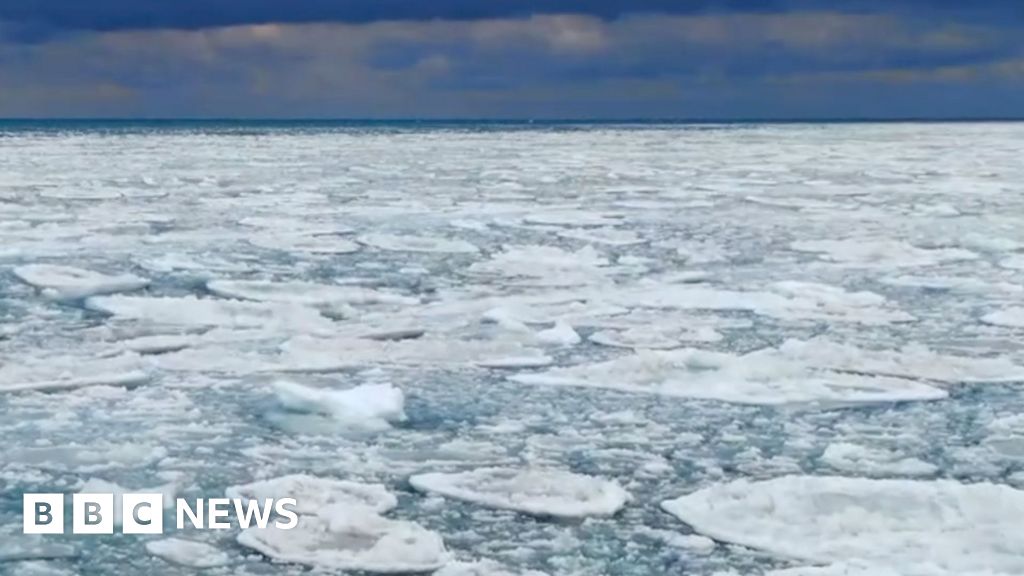ARTICLE AD BOX
 Image source, Dustin Franz/AFP via Getty Images
Image source, Dustin Franz/AFP via Getty Images
Smoke billows from a derailed cargo train carrying dangerous chemicals in East Palestine, Ohio
By Kayla Epstein & Nadine Yousif
BBC News
Anxious residents are still demanding answers 12 days after a train carrying toxic chemicals derailed in the small Ohio town of East Palestine.
"It's pretty dramatic right now," said James Figley, who lives just blocks from the derailment site. "The whole town's in an uproar."
Mr Figley, a 63-year-old graphic designer, was sitting on his sofa on the night of 3 February when he heard the horrifying sound of metal screeching to a halt. He and his wife got in the car to investigate, and discovered a hellish scene.
"There were a series of explosions, continuing, and the smell was getting to be horrendous," Mr Figley said.
"If you ever burn plastic in your backyard, and [get] that black smoke? That was it," he said. "It was black, just black. You could tell it was a chemical smell. Burning your eyes. It could get really bad if you were downwind."
Fires sprung up from the accident, panicking residents who lived just blocks away.
Days later, a toxic pillar of smoke towered over the town, as officials burned off a dangerous chemical known as vinyl chloride before it could explode.
Over the next few days, dead fish appeared in the creeks - thousands of them, officials later confirmed. People nearby told local media that their chickens died suddenly, their foxes panicked, and their pets fell ill. Residents complained of headaches, burning eyes and sore throats.
State and federal officials, including Governor Mike DeWine, said that they had tested the area extensively and found it safe for humans. They assured residents that they were removing contaminated soil from the site, and the air and municipal water quality was now normal.
The disconnect between what some residents have reported, and the assurances that officials continue to issue, has led to confusion and fear in East Palestine. Meanwhile, a mixture of environmental and health experts have questioned whether the site is truly safe, and social media sleuths have claimed that officials are not telling residents the whole story, despite government officials' frequent updates and ire at the railroad.
Some locals have welcomed the extra scrutiny.
"There's way too much we don't know," Mr Figley said.
The facts about East Palestine
Officials have provided some details about the Norfolk Southern train that derailed on 3 February on its way to Pennsylvania.
The train hauled about 150 freight carriages, 50 of which were hit by the crash, Mr DeWine said at a press conference on Tuesday. About 10 of them carried potentially toxic materials.
An exact cause for the derailment has not yet been determined by the US National Transportation Safety Board, but they said that it may have been related to a mechanical issue on one of the car axles.
Its cars were carrying, among other substances, vinyl chloride, a colourless, hazardous gas that is used to make PVC plastic and vinyl products.
Vinyl chloride is also a known carcinogen. Acute exposure to the chemical is linked to dizziness, drowsiness and headaches, whereas prolonged exposure can cause liver damage and a rare form of liver cancer.
On 6 February, after evacuating the immediate area, officials conducted a controlled burn of the vinyl chloride. Federal, state and railroad experts concluded it would be safer than allowing the material to explode and send shrapnel flying through the town, Mr DeWine said, calling it a choice between "two bad options".
Image source, Reuters
Image caption,Officials estimate that 3,500 fish from 12 different species died in nearby water bodies as a result of the derailment
The controlled burn spawned an apocalyptic plume of smoke over East Palestine. The images went viral on social media, with many shocked observers likening it to a disaster film.
Days later, Mr DeWine, Pennsylvania Governor Josh Shapiro, and Norfolk Southern declared the burn a success, and residents were allowed to return once officials had deemed it safe.
"For us, when they said it was all clear, we decided it was OK to come back," said East Palestine resident John Myers, who lives with his family in a house near the derailment site.
He said he had not experienced any negative side effects. "The air smells like it always does," he said.
On Tuesday, the US Environmental Protection Agency said that it had not detected any significant levels of hazardous substances in the air. The agency has screened nearly 400 homes so far, it said, and did not detect any chemicals, though they are continuing to examine more homes in the area and conduct air quality monitoring.
After the accident, the EPA did find traces of chemicals in water samples nearby, including the Ohio River. Those contaminated waters, the agency said, had entered storm drains. Ohio officials recommended that concerned residents, or those who relied on private sources, drink bottled water, and offered to test residents' water supply or drill new wells if requested.
By Wednesday, Ohio's state Environmental Protection Agency assured residents that wells feeding the local water systems tested free of chemicals from the derailment, and the municipal water supply was safe to drink.
'A lot of distrust and scepticism'
For some, it has been hard to reconcile the apocalyptic images of a toxic plume with the all-clear the government recently gave East Palestine.
Social media users, particularly on Twitter and TikTok, have fixated on reports of harmed animals and images of the vinyl chloride burn, demanding more answers from officials.
After people posted videos of dead fish to social media, officials acknowledged the phenomenon was real. Around 3,500 fish of 12 different species had died after the crash across 7.5 miles of streams south of East Palestine, the Ohio Department of Natural Resources said.
However, officials said they had not received reports that the derailment or chemical burn had led directly to the deaths of livestock or other terrestrial animals.
Image source, Getty Images
Image caption,Residents have been fearful of the impacts the toxic chemicals may have on their health
Residents in the immediate area have complained of headaches and nausea more than a week after the chemicals were burned, according to reports in the Washington Post, New Republic and local media outlets.
Environmental experts told the BBC they had misgivings about the government's decision to allow people to return to East Palestine so soon after the crash and controlled burn.
"It certainly feels like state and local regulators moved too quickly to move too quickly to give the green light to people to go back," said David Masur, executive director of the PennEnvironment Research & Policy Center.
"That builds a lot of distrust and scepticism from the public about trusting these agencies, which is a problem," he said.
In addition to vinyl chloride, several of the other substances on the train could form dangerous compounds when burned, including the dioxin, said Peter DeCarlo, a professor at Johns Hopkins University who studies air pollution and air quality.
"That, as an atmospheric chemist, is something I would want to steer very, very, very clear of," he said, adding that he wanted the EPA to release more detailed data about the air quality.
At least four class-action lawsuits have since been filed by East Palestine residents against Norfolk Southern railway, alleging they have been exposed to toxic substances and have suffered "severe emotional distress" as a result of the derailment.
"A lot of our clients are really considering… possibly moving away from the area," said Hunter Miller, an attorney representing East Palestine residents Ray and Judith Hall in a class-action suit against the railroad.
"This is supposed to be their safe haven, their happy place, their home," Mr Miller said. "And now they feel like their home has been infiltrated, that they're not so sure that this is a safe haven anymore."
On Tuesday, a reporter asked Mr DeWine if he would personally feel safe returning home if he lived in East Palestine.
"I would be alert and concerned," Mr DeWine said. "But I think I would probably be back in my house."

 1 year ago
54
1 year ago
54








 English (US) ·
English (US) ·